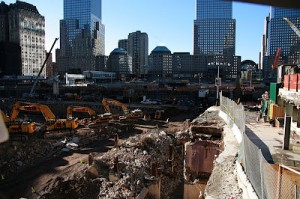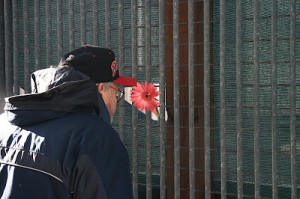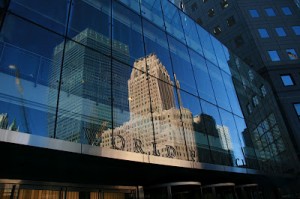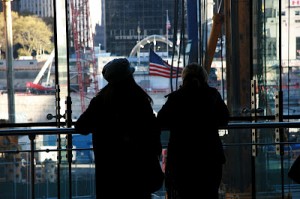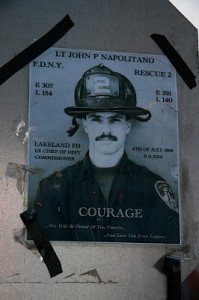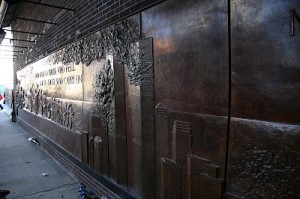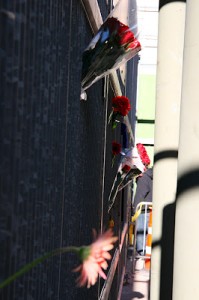In September 2001, I was living in Upstate New York (meaning, as the obligatory joke roughly goes, somewhere north of 186th Street). A little over a year earlier, I had heeded the call of wanderlust and left my rewarding but insufficiently purposeful and fulfilling videogame programming job in San Francisco to pursue my own entrepreneurial endeavor — the realization of ideas that had been gnawing at my restless mind for some time. The largely solitary research I then pursued being eminently portable, I was in the perfect position to relocate when my then-girlfriend, now wife decided to return to school for a graduate degree. New York state turned out to be the place, and the dramatically lower cost of living in the small town by the Hudson that we were headed for suited my purposes just fine. Lower expenses vs. living in Bay Area California meant a slower burn rate for the hard-earned, socked-away cash and investments I would be using to self-finance my project, and that was a very good thing — for what I needed most was time to think. We sold our furniture and non-essentials, and hit the road East for a new adventure. That was the summer of 2000.
Our first year of adapting to this transition went well, considering what a change it was transplanting ourselves to a quiet small town and the even smaller, more isolated community of the graduate art program. We had rented the upstairs of an old but satisfactory white clapboard house, for a price that would be unheard of back in California. We learned about heating oil and boilers and changing tires for the winter. We crossed a bridge over the magnificent Hudson River to do our weekly shopping. We visited historic sites that had been beyond the easy reach of our mostly car-less Connecticut college experience. We sledded.
I pursued my research, at the college’s libraries or at home, and strove daily to keep focus in my imperfect and occasionally uncertain, wandering mind. I had been on my own like this before (I will likely write about that at another time), knew that it would take all the self-discipline I could muster, knew also that if I didn’t persevere and give it my best shot I’d be driven mad by the road not taken, by ideas that would not leave me alone.
That year was also an eye-opening continuation of my first encounters with the Contemporary (as distinct from Modern) art world and the cultural attitudes and ideologies that have tended to dominate it, and a foreshadowing of many such encounters that would continue to this day (another subject I hope to write about at greater length another time). I had then only the first and faintest inkling of the bleak perspectives and frequent obsession with cynical cultural criticism that I would often encounter in the work of contemporary artists.
As summer 2001 rolled around, it became clear that our remaining assets weren’t going to last us comfortably another year at our current rate. Our investments weren’t doing as well, and I had underestimated some of our expenditures. I did some job-hunting, seeking to put my software engineering skills to use to generate some income for us. The suitable opportunities in that part of the country were few, and the prospects I did find would have required me to move on my own to Boston or Albany or New York City — incurring among other more practical inconveniences an emotional cost of separation that we did not want to bear.
In anticipation of my need to depart, my girlfriend had made arrangements to share an apartment with two of her female classmates who we had begun to get to know during the program’s first year. When August arrived and it became clear that I would not settle my job hunt before the time came to move, I was graciously invited to be a fourth roommate on a temporary basis. It seemed like a good arrangement, and it was at the time. None of us could have forseen the world-upending historic event that silently approached, or what it would mean for us.
On the morning of September 11th, my girlfriend and I were awakened from an otherwise ordinary night’s sleep by the alarmed shouts of one of our roommates outside our door. My girlfriend’s parents had called from their home in Europe, and our roommate had answered the phone and was relaying the news to us as she received it herself. I don’t know whether she was repeating exactly what was said to her, but I will never forget the sound of her increasingly alarmed words as she exclaimed through the door, phone in hand: “There are bombs all over New York!”
After hearing something so unthinkable we got up with a sudden start of course, and, like so many others that morning, headed to the TV with a great sense of urgency to find out what was happening. As the picture tube warmed up, in faded the scroll-by newsbytes, the solemn news anchor (I don’t remember which), and the terrible, haunting image of the North Tower of the World Trade Center bleeding a long, slowly rising plume of dark smoke. Reports were that a plane had hit the tower. Nobody knew why. Could it have been a terrible, terrible accident? How could such a thing have possibly happened?
We sat stunned and spellbound, anxiously awaiting each fragment of new information — even just new speculation — as the news coverage repeated and ad libbed in that early time before anyone had the remotest idea what had just happened, much less grasped its immense historic significance — that this was the sudden and irrevocable end of one era and the beginning of another. Hauntingly, the then-unexplained southward turn of American Airlines Flight 11, which was soon identified as the plane that had hit the WTC, had brought its flight path through skies fairly close to where we lived. I got a terrible chill thinking of its passengers’ last minutes alive, soaring past us down along the Hudson on that perfectly beautiful, crisp, clear day — surely, I supposed, not knowing the terrible end that awaited them in Lower Manhattan.
Then something still more unthinkable happened that, impossibly enough, shocked us out of the shock we were already in, and into a daze of complete disbelief and confusion — killing instantly any hope that this had been some awful accident. Before our very eyes, United Airlines Flight 175 flew into the South Tower.
As the impossible reality of the day’s events sank in, it gradually became clear to me: Our country and its people had been attacked. And in the slow dawning of that terrible realization through the coming hours — hours that brought with them the crashing of American Airlines Flight 77 into the Pentagon, the crash of United Airlines Flight 93 and its heroic passengers in a field near Shanksville, Pennsylvania, and complete uncertainty about what else might still be in store — both a terrible fury and a somber determination welled up in me. Things were going to be different now. They had to be. I was sure that we would snap out of our useless, toxic gloom of cultural self-doubt, drop our idle infighting over comparatively trivial disagreements, identify those who sought to cause us all such terrible harm, and go after them with swift and united resolve — unequivocally removing their capacity to mount further attacks, and never again allowing such a thing to happen.
The terrible events of September 11th changed me, and seemed to mark what I was sure would be a watershed, a tectonic shift for our entire country, and for the world. I assumed 9/11 had had a similar effect on everyone I knew. I was soon to find out just how mistaken I was in that assumption.
It wasn’t long before the self-recrimination began to flow from those around me, first in a trickle, then more and more freely as the days went by. Didn’t you know, we had it coming? Probably deserved it, even. Of course, we’re going to jump the gun and blame The Arabs, while those responsible were probably homegrown fanatics of our own making. (Oklahoma City was still fairly fresh in everyone’s mind then.) People who looked Middle-Eastern were of course going to be targets of random mob violence on a massive scale, and/or rounded up and put in internment camps, because — don’t you know? — that’s just the kind of unsophisticated, “jingoistic”, racist simpleton bumpkins we Americans are.
“I can’t believe what I am hearing in this house,” I finally declared after perhaps two or three days of this. How could anyone begin to rationalize and justify such malicious horror — the deliberate, premeditated flying of aircraft full of people into buildings full of people — the vicious mass murder of so many?
At this, our roommate who had answered the phone on the morning of 9/11 shot back unhesitatingly in a dead-serious fury: “America mass-murders every day!”
I’m quite certain that my jaw dropped in dumbfounded astonishment. I was stunned — flummoxed beyond any ability to comprehend and respond to the concentrated vitriol that had just reached my ears, particularly in light of all that had just happened. The cognitive dissonance left me frozen in my tracks, speechless. I held no pretension that our nation’s history was flawless and unmarred, but surely this degree of venomous contempt was not deserved. (During my visit for the program’s graduation the following Spring, the same roommate quite casually announced — in much the same way that one might express delight in the discovery of a new favorite ice cream flavor — “I think I’m a Marxist.” Well, there you go. At least she’s not affiliating herself with mass murderers.)
I might have been able to dismiss such occurrences had they remained confined to our household. I soon learned, however, that the decay afflicting our culture’s self-image was (and still is) much more extensive and persistent than I had realized. All around me in this academic setting, the primary concern seemed to be not how we were going to win this one or what despicable monsters the attackers were, but what unjustifiably terrible things the United States was now likely to do. Mass e-mails expressing American resolve to stand up and fight back, of the kind that commonly circulated back then, were derided. The then-ubiquitous U.S. flags that flew from car antennas and windows were greeted with a disapproving roll of the eyes. The increasing prevalence of the same flags on commercial products was derided too, consistent with a worldview that holds commerce to be something outside of us that manipulates us, rather than an expression of and by us, an integral and vital part of our own culture that was simply reflecting the defiant, heartfelt pride and determination to go on that many authentically felt. In response to my despairing expression of incomprehension at such horrific and vicious attacks, another of my girlfriend’s classmates referred me to a website that he gently assured me explained it all. And that it did — through the grim and twisted lens of Chomsky-ite faith in America the Ugly and Brutal, and her innumerable (or perhaps enumerable) sins that made us deserving of the world’s contempt and such a hateful, murderous surprise attack.
This kind of thing continued in various other forms, until I gradually got the message that I was very, very alone in my thoughts and views. Even my girlfriend didn’t know what to make of my behavior, and was disturbed by my words and my anger, and the uncomfortable living situation they created for us. As the gloom of that realization and of that climate of cultural self-recrimination encircled me, I withdrew, holed up, and learned to keep my thoughts largely to myself. I had not at that point gotten wind of the budding “blogosphere”, much less managed to find solace in writers who felt as I did. I felt utterly and completely alone. I had to save myself, I concluded — to get out of an environment where I felt trapped and poisoned — but my remaining resources were by then very limited, and I had made the mistake of letting myself become financially dependent on what had become a very deeply psychologically bad situation for me. Gathering my last reserves of embattled optimism, I redoubled my job-hunting efforts. An attractive offer came in from my previous employer in February. I came very close to taking it, but my own need for self-rescue was not the only factor in play. My girlfriend was paddling hard against the proverbial current to finish her graduate degree, and needed me there for moral support. I stayed a while longer, keeping my feelers out for other, possibly more local job opportunities. Eventually another offer came from California, and with our savings dwindling and only a little over a month now left to go in the graduate program, I took it.
The fresh start did me good — being wanted, needed enough to be moved across the country by my new employer certainly helped to pick up my spirits. But I was still under the weight of a terrible gloom, still reeling from what I had been through and could not stop thinking about. I have an indelible image in my mind of sitting outside at lunch, looking up at a company building against a clear blue California sky — feeling simultaneously grateful to have a handle on my life and surroundings again, and somber with the weight of memories and thoughts I couldn’t shake.
At the program’s graduation ceremony in May of 2002, which I returned to attend, the college’s president followed his expression of sympathy for the 9/11 victims and their families with an expression of his profound shame at being an American in these times — for which, to my astonishment and disgust, he was roundly applauded and cheered. It took all my self control and decorum not to hiss and boo at this display of insular, ungrateful, self-righteous pontification.
Those who’ve kept track of the post-9/11 timeline will recall: Our nation’s response was still confined to the war in Afghanistan, back then.
I held my tongue. This day belonged to the hard-fought achievements of those who were being awarded their degrees, my girlfriend among them, and I did not want my own self-indulgence to detract from that. If only the college president had felt the same. Apparently, either no one objected, or they were just as silent about it as I was.
Prior to the events of September 11th, 2001, I had developed an awareness of our gloomy climate of cultural self-doubt, idle self-recrimination, and intellectually fashionable college campus radicalism — first with startled dismay, then with grim resignation — and naïvely supposed that the appearance of some new, bona fide external threat would eventually wake us out of our idle funk. In hindsight, I could not have been more mistaken. The roots of our cultural self-distrust run far, far deeper than I had ever dared suppose, casting our future as a country, culture, and civilization into serious doubt. To this day, I find myself deeply troubled by the question of what, if anything, we can do to recover from the sad state we seem to be stuck in, and for all my usual optimism I find it hard to imagine a day when I won’t have cause for such worry.
Previous post: Tomorrow is 9/11
Next post: 9/11 Quotes
